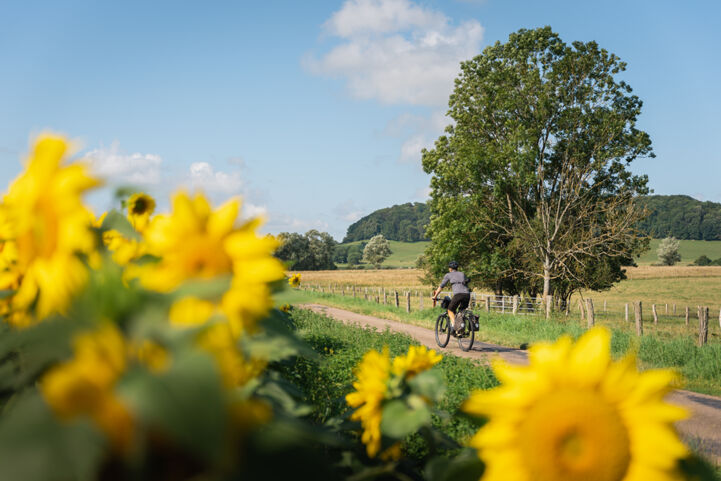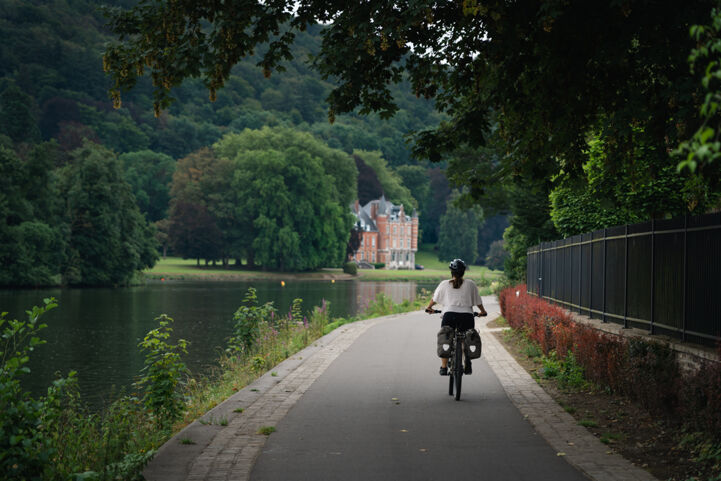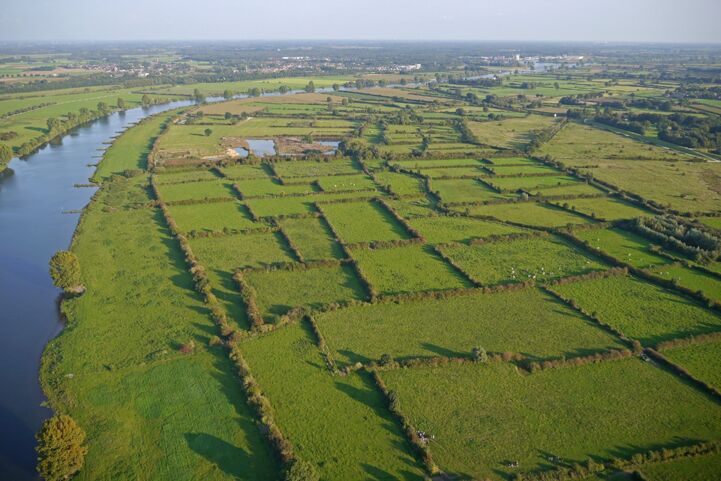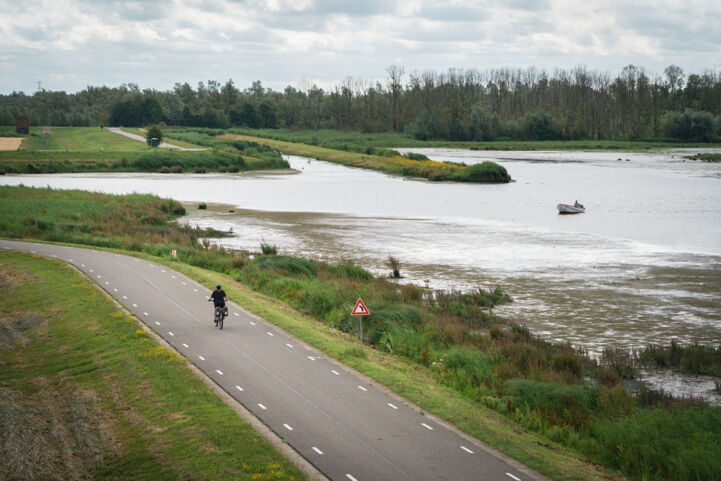EuroVelo 19 – Öko-Tour: Förderung des nachhaltigen Fahrradtourismus
Der EuroVelo 19 – Meuse Cycle Route folgt einem der bedeutendsten Flüsse Europas, von seiner Quelle bis zum Zusammenfluss mit dem Rheindelta in den Niederlanden. Auf über 1 000 Kilometern führt die Route durch drei Länder: Frankreich, Belgien und die Niederlande. Obwohl es sich um die kürzeste EuroVelo-Route handelt, wartet sie mit abwechslungsreicher Landschaft, faszinierender Natur und reichem kulturellem Erbe auf.
Durch Frankreichs Meuse radeln
Der EuroVelo 19 führt Radfahrende durch einen geschützt gehaltenen Bereich in Frankreich. Da die Meuse größtenteils unreguliert fließt, profitiert sie vom Schutz ihrer Wiesen. Das Maastal dient als bedeutender Zugkorridor, vor allem für den Kranich. Die Wiesen bieten Jagd- und Nahrungsgebiete für zahlreiche Vogelarten. 2014 haben sich in Monthairons Weißstörche angesiedelt.
Die Route verläuft durch die reizvolle Region der Ardennen, bekannt für dichte Wälder und nachhaltige Tourismusinitiativen. Das Ardenne Ecotourism-Netzwerk stellt sicher, dass Unterkünfte und Gastronomiebetriebe verantwortungsvolle Praktiken praktizieren, etwa mit Geothermieheizung, ökologischen Baustoffen sowie saisonalen, regionalen Speisen.
Für Radfahrerinnen, die eine gemütliche und nachhaltige Unterkunft suchen, ist Camping Aux Sabots de Vent eine kreative Alternative. Die runden Häuschen erinnern an Iglus, bestehen jedoch aus natürlichen Materialien wie Kalk und Hanf, die traditionelle Techniken mit ressourcenschonendem Bauen verbinden.

Beim Passieren der Region können Sie auch kulturelle Höhepunkte erleben, z. B. auf den "Marchés des producteurs de pays“, regelmäßigen Bauernmärkten in nahegelegenen Orten. Und natürlich gehört der Genuss einer Ardenner Biertradition, die bis ins 12. Jahrhundert zurückreicht, einfach dazu. Besonders hervorzuheben sind Biere der Abbaye de Signy, nach klösterlichen Rezepten, sowie die charaktervollen Kreationen der Brauerei Ardwen.
Diese Etappe führt zudem durch Naturparks wie Monthermé, wo dramatische Flussmäander atemberaubende Ausblicke bieten, und tiefe Wälder, die ideal sind für Wanderungen und Naturerlebnisse.
In Verdun engagiert sich das Hotel Jardin du Mess aktiv für nachhaltigen Tourismus mit konkreten CSR-Maßnahmen: Mülltrennung, plastikalternativenlosen Betrieb und ökologische Gartenpflege zur Förderung der Biodiversität.
In den Vogesen zeichnet sich der Campingplatz Domremy durch seine ruhige Lage aus – ideal für eine naturnahe Rast. Zur Stärkung umweltfreundlicher Mobilität erhalten Gäste, die zu Fuß oder mit dem Fahrrad kommen, einen 10 % Rabatt.
Entlang der Vogesen-Route sind zwei Naturjuwele besonders sehenswert: Die kalkhaltigen Wiesen bei Circourt-sur-Mouzon und Maxey-sur-Meuse. Diese seltenen Lebensräume bilden wahre Biodiversitätsreservoirs und verleihen dem westlichen Teil der Vogesen ein mediterranes Flair – mit Wildorchideen, Reptilien, Grillen und Schmetterlingen.
Nachhaltiger Tourismus in Belgien entdecken
Beim Übergang nach Belgien führt die Meuse-Radroute durch Wallonien und Flandern, die jeweils ihre eigenen nachhaltigen Projekte präsentieren.
Die bucolischen Landschaften entlang der majestätischen Meuse eröffnen Einblicke in das reiche Natur- und Industrieerbe Walloniens. Auf der sogenannten Zitadellen-Route können Sie die vier Bollwerke Walloniens besuchen: Dinant, Namur, Liège und Huy. Viele touristische Betriebe verfolgen eine nachhaltige Ausrichtung und sind mit Labels wie Green Key oder Bienvenue vélo ausgezeichnet – etwa das Hôtel Château de Namur und das Pentahotel in Lüttich. Ebenso empfehlenswert sind regionale Spezialitäten wie Ardenner Blutwurst und Leberpudding, begleitet von herrlichen Ausblicken auf die Meuse und die Grüngürtel.

Im belgischen Limburg verlaufen die Radwege meist entlang autofreier Dämme durch blühende Wiesen. Das RivierPark Maasvallei ist ein Highlight: Ein transnationales Naturschutzgebiet, das durch Landschaftswiederherstellung besticht. Hier darf die Meuse (Maas auf Niederländisch) wieder freier fließen, was Feuchtgebiete und Kiesbänke entstehen lässt – Lebensraum für Otter, Biber, Zugvögel und Großsäuger wie Konik-Pferde und Galloway-Rinder. Das Besucherzentrum De Wissen bietet lehrreiche Ausstellungen und ruhige, elektrische "Whisperboats“ für Tierbeobachtungen entlang der Altarmbereiche. Wer eine umweltfreundliche Unterkunft sucht, wählt das Botel Ophoven (ein schwimmendes Hotel) oder den Biej Bokke Bauernhof-Camp – beide verbinden Komfort mit Naturerlebnis.
Niederlande: unendliche grüne Erlebnisse
Der EuroVelo 19 erreicht die Niederlande durch Südl Limburg, wo er das RivierPark Maasvallei mit Belgien gemeinsam nutzt. Kulinarisch überzeugen Orte wie Ut Bakkes Maasbendj – mit hausgemachten Kuchen und regionalem Honig – oder die Bisschopsmolen in Maastricht, eine historische Wassermühle, wo man die traditionelle Brotbereitung beobachten und frische Speisen genießen kann. Die Region ist bekannt für kreative Nachhaltigkeitsinitiativen wie Sitzgelegenheiten aus recycelten Materialien und einen beweglichen Aussichtspunkt im Park, der ein umweltschonendes Naturerlebnis bietet.
Die Radroute führt weiter durch Nord- und Zentral-Limburg mit attraktiven Umwegen zu Biodiversitäts-Hotspots wie dem GrensPark KempenBroek (UNESCO-Reservat) und den Terrassenwäldern des Nationalparks De Meinweg. Regionale Köstlichkeiten wie das Livar-Klosterschwein und die Lindeboom-Brauerei bereichern das Erlebnis. Umweltfreundliche Unterkünfte wie De Maashoeve oder De Sangershoeve bieten oft Fahrradservice und legen Wert auf Biodiversität.

Im Land van Cuijk prägen traditionell beeinander verflochtene Hecken – die Maasheggen – die Gründstücke. Diese alte Kulturlandschaft zählt zum UNESCO-Programm „Mensch und Biosphäre“. Radfahrer*innen finden passende Unterkünfte in Perron22 und Herberg Thijssen, beide fahrradfreundlich.
Durch den Biesbosch-Nationalpark, Europas größtes Tiden-Süßwassergebiet mit Wasserläufen und Weidenwäldern, verlaufen herrliche, naturbezogene Routen. Lokale Initiativen fördern dort zirkuläre Landwirtschaft, Biodiversität und regionale Produkte. Die "Smakelijke Streek“-Route und die Molentocht bieten kulinarische Erlebnisse mit lokalen Spezialitäten.
Im letzten Abschnitt in Richtung Rotterdam durchqueren Sie die Insel Voorne-Putten, ein Deltagebiet mit restaurierten Wasserläufen, Salz- marschen und Schlickflächen. Dort finden sich geschützte Zonen wie Voornes Duin und Beninger Slikken mit reicher Biodiversität. Ein nachhaltiger Stopp lohnt sich im Restaurant aan Zee, gebaut aus natürlichen Materialien und betrieben mit Wind‑ und Solarenergie. Ein besonderes Highlight: Während eines jährlichen Events können Gäste dort sogar mit Holz statt Geld bezahlen – ein wunderbares Beispiel für die Verbindung von Kulinarik und Umweltbewusstsein.

Die Meuse per Rad erleben: Eine Reise in Natur und Nachhaltigkeit
Damit die Meuse-Radroute auch künftige Generationen fasziniert, tragen wir alle Verantwortung beim Schutz der durchquerten Landschaften. Um dieses einzigartige Naturerlebnis zu bewahren oder sogar zu verbessern, ist es entscheidend, es so zu hinterlassen, wie wir es vorgefunden haben. Eine effektive Methode dafür ist die Befolgung der "Leave No Trace“-Prinzipien – einfache Regeln zur Minimierung des eigenen ökologischen Fußabdrucks bei Outdoor-Erlebnissen, sei es beim Wandern, Picknicken oder Radfahren entlang der Meuse.
So fördert etwa das Rivierpark Maasvallei durch Aktionen wie "Maas cleanup kayak“ das aktive Engagement der Besucher – Paddelnde sammeln im ruhigen Fluss betörend mitgeführte Abfälle.
Zusätzlich helfen bewusste Entscheidungen, wie die Wahl umweltfreundlicher Unterkünfte und die Unterstützung lokaler Anbieter, dabei, fragile Ökosysteme, Kulturgüter und die einzigartige Ästhetik des EuroVelo 19 zu erhalten. Saubere, gesunde und ruhige Wege sind kein Selbstzweck – sie sind das Ergebnis verantwortungsvoller Reisepraxis.
Artikel von Mariona Garcia‑Arbós i Mata
Titelbild: Radfahren in den Maasheggen im niederländischen Brabant